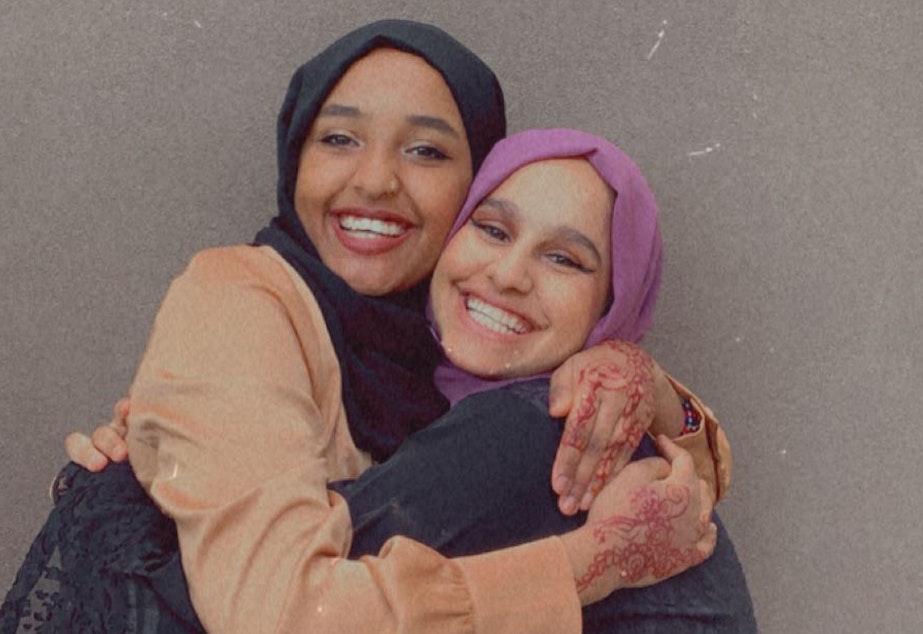This Muslim teen didn't have a place at school to express her needs, so she made one herself

My best friend and I are Muslim teens who attend a mostly non-Muslim school. Here's how we're making our school a more inclusive place for Muslim students like us.
[RadioActive is KUOW's radio journalism program for young people. This story was entirely youth-produced, from the writing to the audio editing.]
M
y best friend, Sadeen Al Ziayad, is a junior at Nathan Hale High School in Seattle. She's funny, and obsessed with turtles.
In January 2020, Sadeen and I got up in front of our whole school at a Martin Luther King Jr. Day assembly and gave original speeches about discrimination.
Sadeen was a sophomore and I was just a freshman when we gave those speeches, but we felt like it was time for us to step up as leaders.
Since then, we've committed to making our school a more inclusive place for Muslim students. We even helped start a Muslim Student Association club with other students at our school.
Sponsored
When Sadeen started high school, she says she didn’t have a place where she could talk to other Muslim students and express her needs. So she made one herself.
“I haven't really seen many Muslim leaders at my school, so I just really wanted to be that for other Muslim students," Sadeen says. "And to encourage other Muslim students to join with me, and for us to lead to make our school better for us. Because only us Muslim students know what other Muslim students need."
When you’re a Muslim student at a non-Muslim school, it can be hard to do simple daily tasks like praying. Class schedules are not designed with Muslim students in mind, and most teachers are unaware or forget about prayer time.
“You would be in the middle of a classroom, and then you're like, 'Oh wait, it's time for prayer now.' And I would have to get the teacher’s attention," Sadeen says. "But that's really hard to do, especially if the teacher is mid-lesson. And it's kind of embarrassing to ask, because you're disturbing the classroom."
When we do go to pray, our high school doesn’t have a designated prayer room. A lot of students pray in the library, but that lacks privacy. Sometimes I use a meeting room, but it’s not always available. Our school was simply not built for students like us.
Sadeen says there’s a power dynamic between teachers and students that makes it hard to ask for what you need. And sometimes, even when you do ask, nothing changes.
Sponsored
“As a student, I have to yell at the top of my lungs to be heard," Sadeen says. "And I have to repeat myself over and over and over again, which is very exhausting. And honestly, having to go to these teachers is really a burden, because it's very hard to talk to authority."
And it’s more than just talking to our teachers at our school. Some of these issues are district-wide. For example, even though all students get Christmas off, school is scheduled during Eid, which means Muslim students who observe Eid have to miss class.
Through the Muslim Student Association, we’ve made more teachers aware of the issues that affect us. And we've created a space to come together as Muslim youth to talk and uplift each other.
Every so often, I think back to those speeches Sadeen and I gave last year. I ended my speech by saying, “The minute we stop talking is the minute we lose our connections, and that's when we fall into the cycle of racism.”
I believe that stands in this situation, too.
We all need to communicate, talk, and listen to one another. It's the only way to make our schools an inclusive space for all of us.
Sponsored
This story was created in KUOW's RadioActive Online Intro to Radio Workshop for 15- to 18-year-olds, with production support from Kenju Waweru and Morgen White. Prepared for the web by Morgen White. Edited by Kelsey Kupferer.
Find RadioActive on Facebook, Twitter, Instagram, TikTok, and on the RadioActive podcast.
Support for KUOW's RadioActive comes from the Bill & Melinda Gates Foundation Discovery Center.
Sponsored
If you have any feedback on this story, you can email RadioActive at radioactive@kuow.org, or fill out the form below. Reach out. We're listening.



